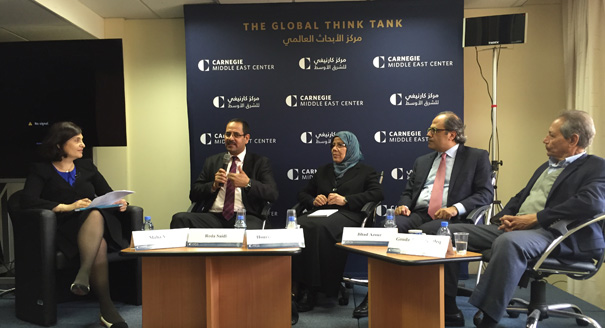Registration
You will receive an email confirming your registration.
For decades, Arab citizens relinquished their political and civic rights in return for welfare and security. But the popular movements that swept through the Arab world over the past four years have sparked widespread debates on what it means to be a citizen in Arab countries.
With growing political turmoil and identity-based violence in the region, these debates have gained additional urgency. For Arab citizens, the concept of citizenship itself is an essential tool not only in the struggle for justice and socioeconomic equality but also in efforts to rethink the political future of their countries.
The Carnegie Middle East Center hosted Gouda Abdel Khaleq, Jihad Azour, Ridha Saidi, and Houriya Mashour to discuss the key challenges facing the political transitions in Egypt, Tunisia, and Yemen. They examined the intersection between contemporary identity politics and historic or sociopolitical injustices, as well as how concepts such as citizenship, national identity, and social justice aid in understanding unfolding crises and proposing alternative policies. Carnegie’s Maha Yahya moderated.
Gouda Abdel Khaleq
Gouda Abdel Khaleq is the former minister of Solidarity and Social Justice in Egypt.
Jihad Azour
Jihad Azour is the former minister of finance in Lebanon.
Houriya Mashour
Houriya Mashour is the former minister of human rights in Yemen.
Reda Saidi
Reda Saidi is the former minister of economy in Tunisia.
Maha Yahya
Maha Yahya is a senior associate at the Carnegie Middle East Center, where her research focuses on citizenship, pluralism, and social justice in the aftermath of the Arab uprisings.
